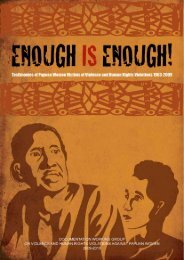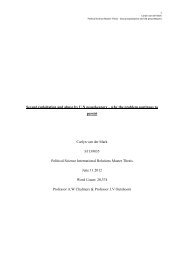The Impact of Armed Conflict on Women and Girls - UNFPA
The Impact of Armed Conflict on Women and Girls - UNFPA
The Impact of Armed Conflict on Women and Girls - UNFPA
You also want an ePaper? Increase the reach of your titles
YUMPU automatically turns print PDFs into web optimized ePapers that Google loves.
Crises usually affect more women than men. Unemployment, underemployment,<br />
gender pay differentiati<strong>on</strong>, unpaid family work <strong>and</strong> care provisi<strong>on</strong><br />
are some <str<strong>on</strong>g>of</str<strong>on</strong>g> women’s painful experiences in transiti<strong>on</strong>ing countries. <strong>Women</strong><br />
suffer from overt <strong>and</strong> covert gender discriminati<strong>on</strong> <strong>on</strong> the labour market,<br />
especially for the young, those with small children <strong>and</strong> middle-aged women.<br />
Skilled <strong>and</strong> pr<str<strong>on</strong>g>of</str<strong>on</strong>g>essi<strong>on</strong>al women assume employment in areas unrelated to or<br />
below their skill levels. Highly educated women such as lawyers, architects,<br />
engineers, <strong>and</strong> university pr<str<strong>on</strong>g>of</str<strong>on</strong>g>essors are forced to accept lower-status, genderidentified<br />
positi<strong>on</strong>s as secretaries <strong>and</strong> recepti<strong>on</strong>ists. If fortunate, women can find<br />
employment with internati<strong>on</strong>al d<strong>on</strong>ors implementing projects in the regi<strong>on</strong>. Some<br />
women refuse to have children for fear <str<strong>on</strong>g>of</str<strong>on</strong>g> losing their jobs. Displaced <strong>and</strong><br />
refugee women resort to petty trades or are obliged to take jobs that urban<br />
women will not accept.<br />
Some women who try to find better living situati<strong>on</strong>s in foreign countries<br />
may become susceptible to organized networks that force them into prostituti<strong>on</strong><br />
<strong>and</strong> exploitati<strong>on</strong>. <str<strong>on</strong>g>The</str<strong>on</strong>g>se women are in new surroundings without social<br />
c<strong>on</strong>necti<strong>on</strong>s, family support or access to informati<strong>on</strong> <strong>and</strong> services, all <str<strong>on</strong>g>of</str<strong>on</strong>g> which<br />
places them at heightened risk for poor health outcomes.<br />
Most training programmes implemented by internati<strong>on</strong>al d<strong>on</strong>ors target<br />
demobilized soldiers in skills-based industries, intending to restructure the<br />
market ec<strong>on</strong>omy. Less attenti<strong>on</strong> is usually given to training women in these<br />
priority areas, which may undermine their involvement in community rebuilding<br />
efforts.<br />
<str<strong>on</strong>g>The</str<strong>on</strong>g> Role <str<strong>on</strong>g>of</str<strong>on</strong>g> <strong>Women</strong>’s NGOs in Rebuilding War-Torn Societies<br />
In the last decade, many social movements have emerged in resp<strong>on</strong>se to<br />
growing problems at local, transnati<strong>on</strong>al <strong>and</strong> internati<strong>on</strong>al levels. United Nati<strong>on</strong>s<br />
global initiatives triggered an increased mobilizati<strong>on</strong> <str<strong>on</strong>g>of</str<strong>on</strong>g> civil societies, setting<br />
political agendas for pressing issues such as envir<strong>on</strong>mental destructi<strong>on</strong>, human<br />
rights, peace <strong>and</strong> disarmament, sustainable development, women’s rights,<br />
trafficking, terrorism, HIV/AIDS <strong>and</strong> drugs. Am<strong>on</strong>g the factors that created large<br />
NGO resp<strong>on</strong>ses to countries in c<strong>on</strong>flict <strong>and</strong> transiti<strong>on</strong> were the slow<br />
democratizati<strong>on</strong> process as well as resp<strong>on</strong>ses from available fund d<strong>on</strong>ors<br />
seeking civil-society partnerships.<br />
NGOs, grass-roots groups <strong>and</strong> social movements have different<br />
organizati<strong>on</strong>al structures <strong>and</strong> goals. <str<strong>on</strong>g>The</str<strong>on</strong>g>y are all are committed to representing<br />
milli<strong>on</strong>s <str<strong>on</strong>g>of</str<strong>on</strong>g> people <strong>and</strong> promoting community-based interests. NGOs, <strong>and</strong><br />
women’s NGOs in particular, have bottom-up participatory organizati<strong>on</strong>al<br />
structures characterized by values-driven, acti<strong>on</strong>-oriented commitments <strong>and</strong><br />
volunteer work. In the 1990s, women’s NGOs played a crucial role in the<br />
promoti<strong>on</strong> <str<strong>on</strong>g>of</str<strong>on</strong>g> women’s rights, especially in family reform legislati<strong>on</strong>, aborti<strong>on</strong>,<br />
reproductive rights <strong>and</strong> domestic violence. In rebuilding <strong>and</strong> sustaining c<strong>on</strong>flict-<br />
107




![IANSA [PDF, 2MB] - PeaceWomen](https://img.yumpu.com/25206379/1/190x123/iansa-pdf-2mb-peacewomen.jpg?quality=85)
![Commitments Sample [PDF, 93KB] - PeaceWomen](https://img.yumpu.com/25206331/1/190x245/commitments-sample-pdf-93kb-peacewomen.jpg?quality=85)










![A Toolkit for Advocacy and Action [PDF, 260KB] - Peace Women](https://img.yumpu.com/25205989/1/190x245/a-toolkit-for-advocacy-and-action-pdf-260kb-peace-women.jpg?quality=85)